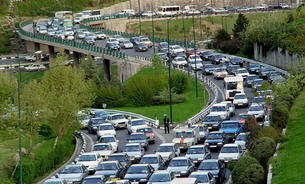Destiny of Traffic in Tehran
Tehran traffic grows on a daily basis and now it is a part of Tehran’s DNA. The question is that now with all-time increasing number of vehicles rolled on to the streets, what will be the destiny of traffic and air quality of Tehran?

Khodrocar – referring to the statistics the number of registered vehicles in Iran has passed 20 million unit. Tehran share out of total is one fifth, 4 million units. As the police announced last year roughly 1.8 million new vehicles were registered and the process is still on the go. Tehran as the capital city is naturally the host to most of these vehicles.
The Traffic and Transport organization of Iran pointed that Tehran capacity of inhabiting vehicles is 750 thousand units but more than 4 million vehicles are driven along the city every day, over 6 times more than the standard capacity.
Compering statistics show great increment in number of vehicles added to Tehran’s streets. Back in 2005 there were 1.5 million vehicles registered with Tehran license plates but no there are roughly 4 million. The number does not even include motorcycles and license plates registered to other cities driven in Tehran.
"Presence of vehicles more than standard can be discussed from various viewpoints but the main point of view would include the public transportation system. In regions 21 and 22 of Tehran there are no subway stations and wherever there are, the number of trains are not enough so they are delayed and that why people have to use personal vehicles. The transportation system must be the way that people use them on their will not that because they have to.” Said Alireza Eskandari, an expert in the field of transportation.
"There are over 6 thousand intersections in Tehran out of which less than one thousand is controlled and managed intelligently. Tehran traffic and transportation organization must offer a way better management method. Proper management of these intersections can ease traffic a lot better.” He added.
Eskandari pointed the low cost of vehicle owning in Iran and continued: "Vehicles are cheap in developed country but are expensive to maintain and that is why it is not reasonable to use personal vehicles. Very powerful public transportation system has also helped the traffic and improved the emissions. The low price of fuel and ease of vehicle maintenance along with poor public transportation system in Iran forces people to use personal vehicles instead.”
He emphasized the downsides of the great number of vehicles and added: "The result of such behavior is nothing but more polluted days and forced shutdown of schools in Tehran.”
The expert finally said: "the priority must be set on improvement of transportation related organizations and their fleet so people are able to use cheap and cleaner public transportation system. The importance of training and education must not be neglected so in longer term we might eliminate the heavy traffics and polluted air.”
Khodrocar Journalist: Fazel Souri
Khodrocar Translator: Mostafa Anisi
Latest News


